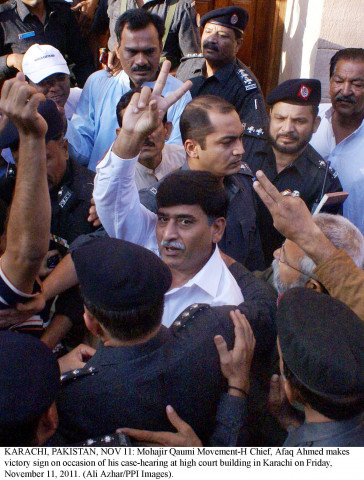Last case: Afaq Ahmed gets bail, likely to be out free on Tuesday
MQM-H leader was accused of being part of a kidnapping in 2001.

This was the last case against Afaq, who has been behind bars since 2004. The case dates back to 2001 when, according to the prosecution, some MQM-H activists barged into the KDA Korangi township office and kidnapped a sub-divisional officer named Jameel Ahmed Baloch, on May 5 at 11:30 am.
The FIR was lodged on May 6 at a half-past midnight by a man named Sheikh Abdullah. The police was investigating the case, when a Major Ashraf brought the supposedly kidnapped Baloch to the Korangi police station and told the men there that he was released from Baitul Hamza, the MQM-H headquarters.
In one of his initial statements, Baloch told the police that three men took him to Baitul Hamza where Athar Usmani, Jamil, Zafar, Younus Eijaz Baboo and Afaq Ahmed were present. However, in subsequent statements he said nothing about Afaq.
The police later arrested a man named Suleman Younus and submitted a charge sheet against him on July 8. They put Afaq Ahmed’s name in column 2, indicating there was insufficient evidence against him.
In its order on Friday, while granting bail, the court noted that, “[Afaq] has been confined in jail since April 4, 2004, therefore the contention that the investigating officer, the SHO of Korangi police station, was not in knowledge of the arrest” was based on mala fide intention.
The court noted that there was no independent witness to testify that Afaq instigated the kidnapping, as alleged by the prosecution. The only witness is the person who filed the FIR and he belongs to a rival political party. Afaq’s name is not mentioned in the FIR and neither did Baloch, the alleged victim, mention his name to the police when he gave his statement under Section 164 of the CrPC.
The anti-terrorism judge also noted that according to the prosecution, the case does not fall under Section 365-A (kidnapping for ransom) but falls under sections 348, 337-A, 34 (abduction by force) of the Pakistan Penal Code which makes it a bailable offence. No clause to prohibit it applies either.
The court referred to the arguments of Afaq’s lawyer, Khurram Maqsood, and said that according to the victim, he saw Afaq sitting in his office. But according to Colonel Abdul Malik of the Rangers, Baloch was released after the Rangers successfully negotiated with Afaq.
Afaq’s lawyer asked why Afaq was not arrested when the MQM-H chief held a Nishtar Park rally a few days after this case was registered.
The court referred to arguments by the Special Public Prosecutor who opposed the bail on the grounds that Afaq was declared a proclaimed offender on December 8, 2001 and therefore was not entitled to bail as he was a fugitive.
Sheikh Abdullah’s lawyer, Muhammad Jiwani advocate, opposed bail, arguing that Afaq ordered Baloch’s abduction and the hostage was released only after the Rangers surrounded Baitul Hamza and forced them to free him.
The judge held that Afaq’s case fell under Section 497 (2) of the Criminal Procedure Code, which means that evidence of Afaq’s role in the crime was not available, and thus the matter needed further inquiry.
While Afaq is free to go now, he is likely to stay behind bars till Tuesday when three of his cases are set to be heard. In one of them he has asked to be put under round-the-clock observation by the Rangers.
Published in The Express Tribune, November 27th, 2011.



















COMMENTS
Comments are moderated and generally will be posted if they are on-topic and not abusive.
For more information, please see our Comments FAQ